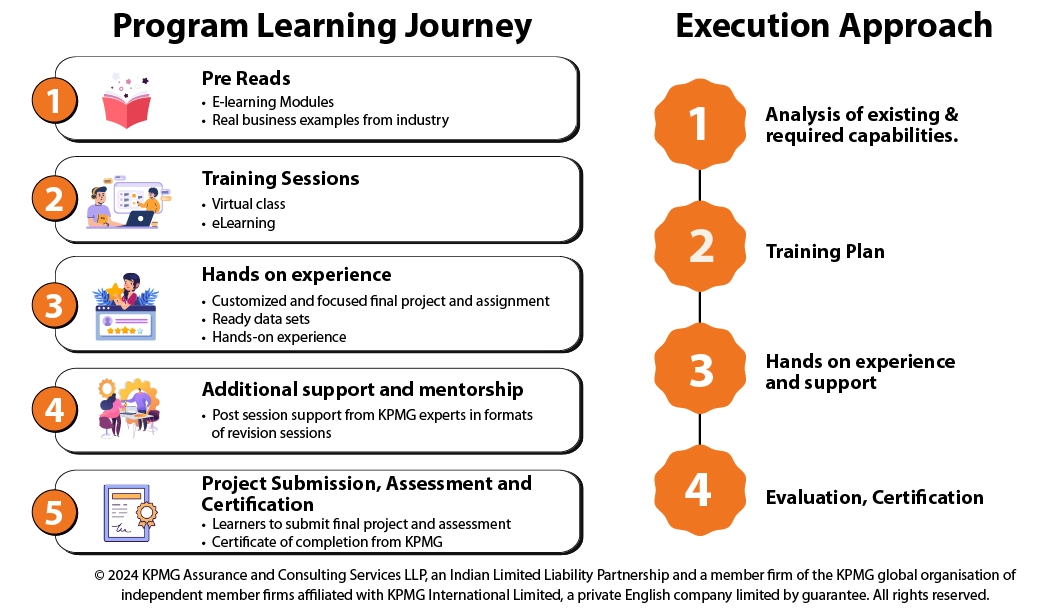Last Day Left! Apply before 18th February 2026 to enroll in the final batch. Call now: 9112-207-207
Operational Analytics - 40 Hrs
The table of contents provides a comprehensive guide to Operational Analytics, focusing on transforming operations and supply chain management through data-driven insights. It covers essential tools like Advanced Excel, SAS, Power BI, and Orange 3, emphasizing data integration, pivot tables, interactive dashboards, and scenario planning. Key topics include statistical methods for data analysis, correlation analysis, hypothesis testing, and vendor performance assessment. Predictive analytics is explored through regression and classification models, time series analysis, and forecasting techniques. Practical applications are illustrated with case studies, culminating in building a comprehensive operational analytics model.
Get in touch +91 9112-207-207
- Introduction to Operational Analytics and its role in transforming operations and supply chain management.
- Covers essential tools like Advanced Excel, SAS, Power BI, and Orange 3 for data analysis and process optimization.
- Focuses on decision support in operational contexts.
- Integrate multiple data sheets using Power Pivot for comprehensive analysis and reporting.
- Build pivot tables, charts, and interactive dashboards to visualize operational metrics and monitor KPIs.
- Utilize Solver, Scenario Manager, and SAS for scenario planning, predictive analytics, and advanced data analysis to enhance operational efficiency and decision-making.
- Learn statistical methods to analyze and interpret operational data for informed decision-making.
- Topics include summarizing data features, correlation analysis, and hypothesis testing for operational processes.
- Assess vendor performance and apply case studies for practical insights and robust operational strategies.
- Learn predictive analytics methods, including regression models, R square, and RMSE for forecasting and evaluating prediction accuracy.
- Build and interpret regression and classification models for inventory prediction and probabilistic demand forecasting, using metrics like confusion matrix, recall, precision, and F1 score.
- Understand time series analysis for identifying patterns and forecasting with Naïve Bayes and exponential smoothing techniques.
- Introduction to Power BI for importing and preparing data, and creating interactive reports and dashboards.
- Use case studies to demonstrate real-world applications and visualize operational data.
- Help operational managers create dynamic visualizations and dashboards to communicate insights and support decision-making.
- Learn the basics of Orange 3, including key features and functions.
- Build and test models, and integrate Orange 3 with Excel data.
- Enable advanced data mining and machine learning techniques for operational analytics.
- Build a comprehensive operational analytics model in a real-world application project.
- Integrate various analytical techniques and tools to solve real-world challenges and drive strategic decisions.
- Apply knowledge to optimize operations, improve supply chain efficiency, and enhance overall organizational performance.
- Integrate various marketing analytics techniques into a comprehensive model.
- Emphasize practical, real-world applications for analyzing marketing data.
- Construct a robust framework for informed decision-making and strategic planning.
Tool Used




About
The
Program
Achieving the set goals within the given time and budget, controlling processes and coordinating between different departments, creating reports, and analyzing them are the core business areas that can be classified as operations. Thus, operations management is one of the essential functions of any organization.
PG Diploma in Operations Management prepares you to confront the challenges put forth by the field, head-on. Academic and industrial experts have designed the curriculum keeping in mind the current orientation of the global industry.
The program aims at training eligible personnel to deliver excellent services at low cost and minimum time, to develop change agents having the adequate competencies and mindsets for creating a rich culture of operational dexterity at the workplace.

Unique Pedagogy
MITSDE's distance learning programs are meticulously designed to bridge the skills gap for working professionals. Our curriculum is constantly updated to reflect the latest trends in management, industry requirements, dynamic business environments, and burgeoning technological advancements. The PG programs are co-created with industry experts and subject matter authorities, ensuring content aligns with real-world applications. You have access to interactive tools, e-books, multimedia content, and comprehensive reference materials.

Academic Partnerships
Launch your global career with MITSDE. Partner with us to gain industry-leading expertise from renowned institutions. Our curriculum integrates global best practices, equipping you with the skills and connections to thrive on the international stage. Graduate with a competitive edge and unlock a world of career possibilities.

Expert Faculty
The MITSDE faculty consists of several academic luminaries and seasoned industry experts, ensuring you receive a well-rounded education grounded in real-world application. These experts actively engage with students through interactive webinars and doubt-solving sessions. This direct interaction bridges the gap between theory and practice, giving you the opportunity to ask questions, clarify concepts, and gain valuable insights directly from professionals at the forefront of your chosen field.
Learning
Outcomes
Course Syllabus
| S.No | Code | Subject | Credits |
|---|---|---|---|
| 1 | S1C10 | Managerial Economics | 4 credits |
| 2 | S1C03 | Business Communication | 4 credits |
| 3 | S1C06 | Legal and Business Environment (Micro and Macro) | 4 credits |
| 4 | S1C15 | Accounting for Managers | 4 credits |
| 5 | S1C01 | Principles of Management | 4 credits |
| S.No | Code | Subject | Credits |
|---|---|---|---|
| 1 | S2C14 | Research Methodology and Management Decision | 4 credits |
| 2 | S2C13 | Management Intelligence System | 4 credits |
| 3 | S2C12 | Financial Reporting, Statements, and Analysis | 4 credits |
| 4 | S2SO1 | Operations Management | 4 credits |
| 5 | S2SO2 | Lean Management Systems | 4 credits |
| S.No | Code | Subject | Credits |
|---|---|---|---|
| 1 | S3C01 | Strategic Management | 4 credits |
| 2 | S3C02 | Organizational Behaviour | 4 credits |
| 3 | S3SO1 | World Class Manufacturing | 4 credits |
| 4 | S4EL4 | Operations Research | 4 credits |
| 5 | S3SO3 | Production, Planning and Control | 4 credits |
| 6 | PWMI1 | Project Work | 6 credits |
| Value Added Skill Certificate - 2 credits |
| S.No | Code | Subject | Credits |
|---|---|---|---|
| 1 | S4SO1 | Emerging Trends in SCM and Logistics | 4 credits |
| 2 | S4SO2 | Entrepreneurship and Venture Capital Management | 4 credits |
| 3 | S4SO3 | Industrial Relations and Labour Laws | 4 credits |
| 4 | - | Elective 1 | 4 credits |
| 5 | - | Elective 2 | 4 credits |
Elective Basket (4 Options , Choose any 2)
| S.No | Code | Subject |
|---|---|---|
| 1 | S4EO1 | Materials Management |
| 2 | S4EO2 | Warehouse Management |
| 3 | S4EO3 | Organizational Strategy in a Global Environment |
| 4 | S4EO4 | Leading People and Organization |
- The above course curriculum is subject to revision as per AICTE guidelines from time to time and as per industry updates.
- Exams would be conducted during the January and July exam cycles.
- All the Exams at MITSDE (Internal & External) are in the form of Multiple Choice Questions.
- Student will have to attempt all the components in the Learning Management System and submit TWO Quizzes (30 marks each) for each subject.
- Internal Examinations carry 60% marks (2 Quizzes of 30 Marks each) and External Proctored Exam carry 40% weightage (passing criteria for both internal & external exam is 50%).
Program
Fees
₹ 96,000 /-
Enquire NowFees Options
- Installment 1
- Installment 2
- Installment 3
Course fee - Installment
- At the time of admission-₹ 26,000 /-
- Within 3 months - ₹ 35,000/-
- Within 6 months - ₹ 35,000/-
Course fee - Lumpsum
- Discount- ₹ 6,000 /-
- -
- Total Lumpsum- ₹ 90,000 /-
- Students are required to pay additional exam fee per exam per attempt and Project Evaluation Fees. For Installments
- First Installment needs to be paid at the time of admission.
- Second Installment needs to be paid within 3 months from the date of admission.
- Third Installment needs to be paid within 6 months from the date of admission
| S.No | Course Duration | Extension | Validity |
|---|---|---|---|
| 1 | 24 Months | 6 Months | 2 Years 6 Months |
Upon completion of the course, you will be in demand in thriving industries like Information Technology, Pharmaceutical, Petrochemical, Construction, Automotive in challenging roles namely:
- Purchasing Manager Plant Manager
- Service Operations Director
- Supply Chain Manager
- Quality Control Officer
- Warehouse Manager
Frequently asked questions (FAQs)
- The KPMG certification training sessions are exclusively held on Saturdays and Sundays.
- Saturdays – 7pm to 10pm
- Sundays – 10am to 1pm
Yes, the KPMG Domain Analytics certification course is part of PGDM, and there is no extra charge for obtaining the KPMG certification. The Domain Analytics certification program will begin in Sem 3 of the PGDM course.
Yes, a 20-minute summary videos of all live sessions will be provided after each live session on the KPMG LMS.
The KPMG login credentials will be activated and shared before the Master E-INDCUTION. you will receive the email from us, and there will be a Master Orientation session to understand the KPMG Domain Analytics Certification Program conducted by the team from KPMG and MITSDE.
The assessments consist of 10 multiple-choice questions (MCQs) worth 5 marks each to gauge conceptual understanding and 3 practical questions worth 50 marks aimed at assessing the application of learned skills. The total marks allotted for the assessment are 100, with a passing percentage set at 50%.
The training program is delivered through Virtual Instructor-Led Training (VILT), utilizing online platforms to connect learners with instructors in a dynamic, interactive virtual environment.
The course spans over a total of 40 hours of live sessions. It is structured to optimize learning outcomes while accommodating the busy schedules of participants.
Participants who clear the Final assessments with a minimum of 50% out of total 100 marks, will receive a Certificate of Completion, while those who fail to clear the final assessment will receive a Certificate of Participation. Participants are allowed two attempts to clear the final assessment, with one free retake. Subsequent retake – only 1, will be charged at Rs. 1000/-. To qualify for the certificate of completion, participants must pass both the project and final assessment, separately.
Participants will have access to KPMG’S Learning Management System (LMS), including Module wise demo videos, session presentations, and access to LMS for two months after completion of each training course.
Yes, there will be a doubt solving session every fortnight, followed by, Exam and project preparation session after the live session concludes.
The project is hands-on and must be submitted in the format recommended by KPMG SME within a specified duration. Participants have only one attempt to submit the project, and the project score significantly influences final certification qualification. The total marks allotted for the Project is 50, with a passing percentage set at 50%.

12 Months
PGCM - Business Analytics
Become part of India's fastest growing Fintech Industry with our Professional course in Fintech
Course Fees
₹ 64,000 /-

12 Months
PGCM - Digital Marketing
Upgrade your skills with trending AI tools & become a top digital marketer!
Course Fees
₹ 64,000 /-

24 Months
PGDBA Operations Management
Get the World's Highest Accredited Lean Six Sigma (Green & Black belt) Certification
Course Fees
₹ 95,000 /-

24 Months
PGDM Project Management
Leverage your exceptional management skills with our PMP Prep course and land your dream job today!
Course Fees
₹ 90,000 /-

15 Months
PGDM Executive Modern Project Management
Aspiring to be a Project Manager? Take the first important step with the CAPM Prep course today!
Course Fees
₹ 95,000/-
 in India across is the academic partner for the Operational
Analytics Certification Program. ( Optional)
in India across is the academic partner for the Operational
Analytics Certification Program. ( Optional)

